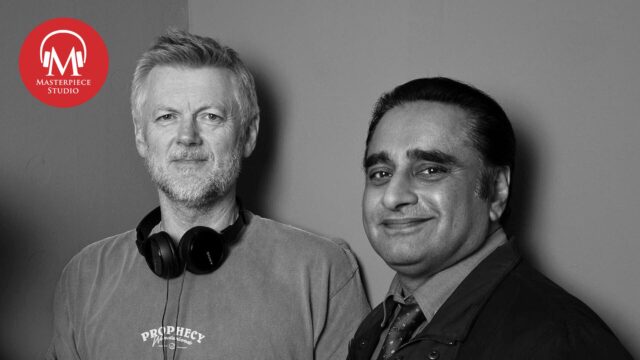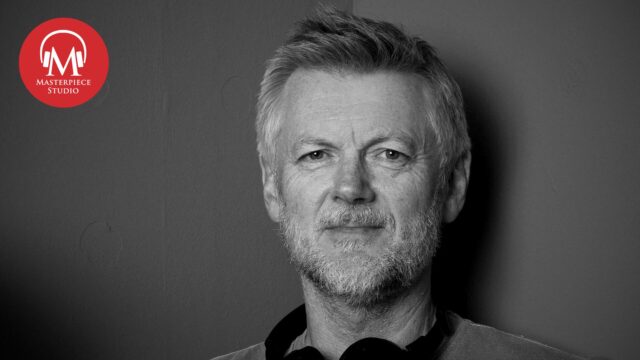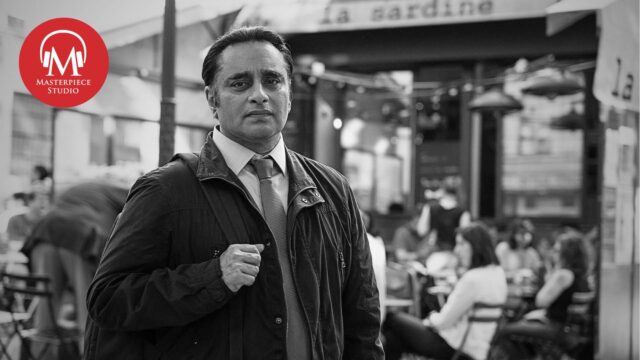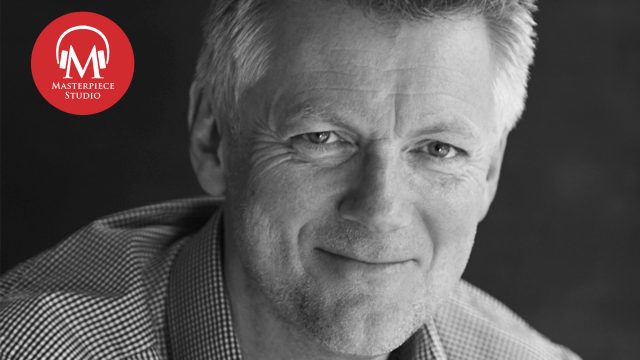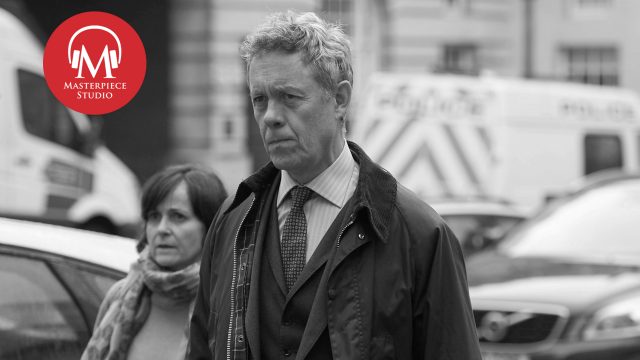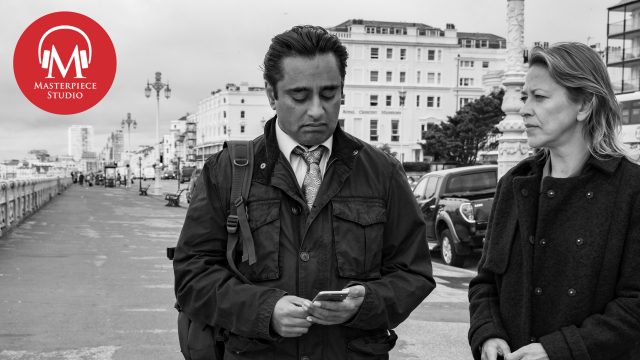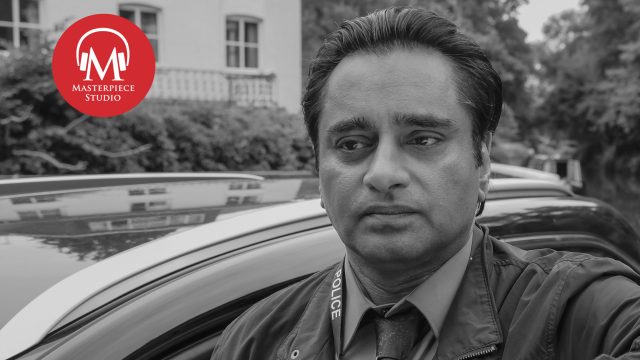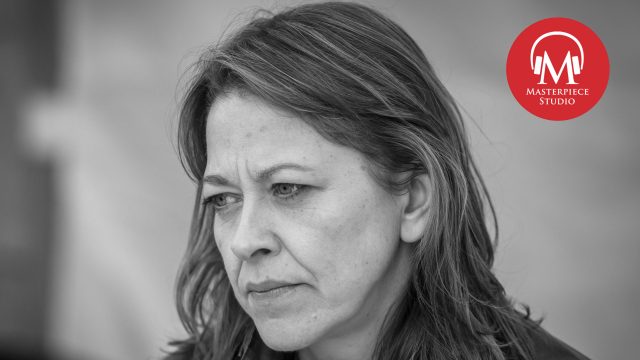When writer Chris Lang created the MASTERPIECE Mystery! series Unforgotten, he looked to capture the very ordinary extraordinariness of a modern police force. With a new season on the way, Lang explains what viewers should watch out for as Cassie and Sunny unearth another unidentified body beneath a London roadway construction site.
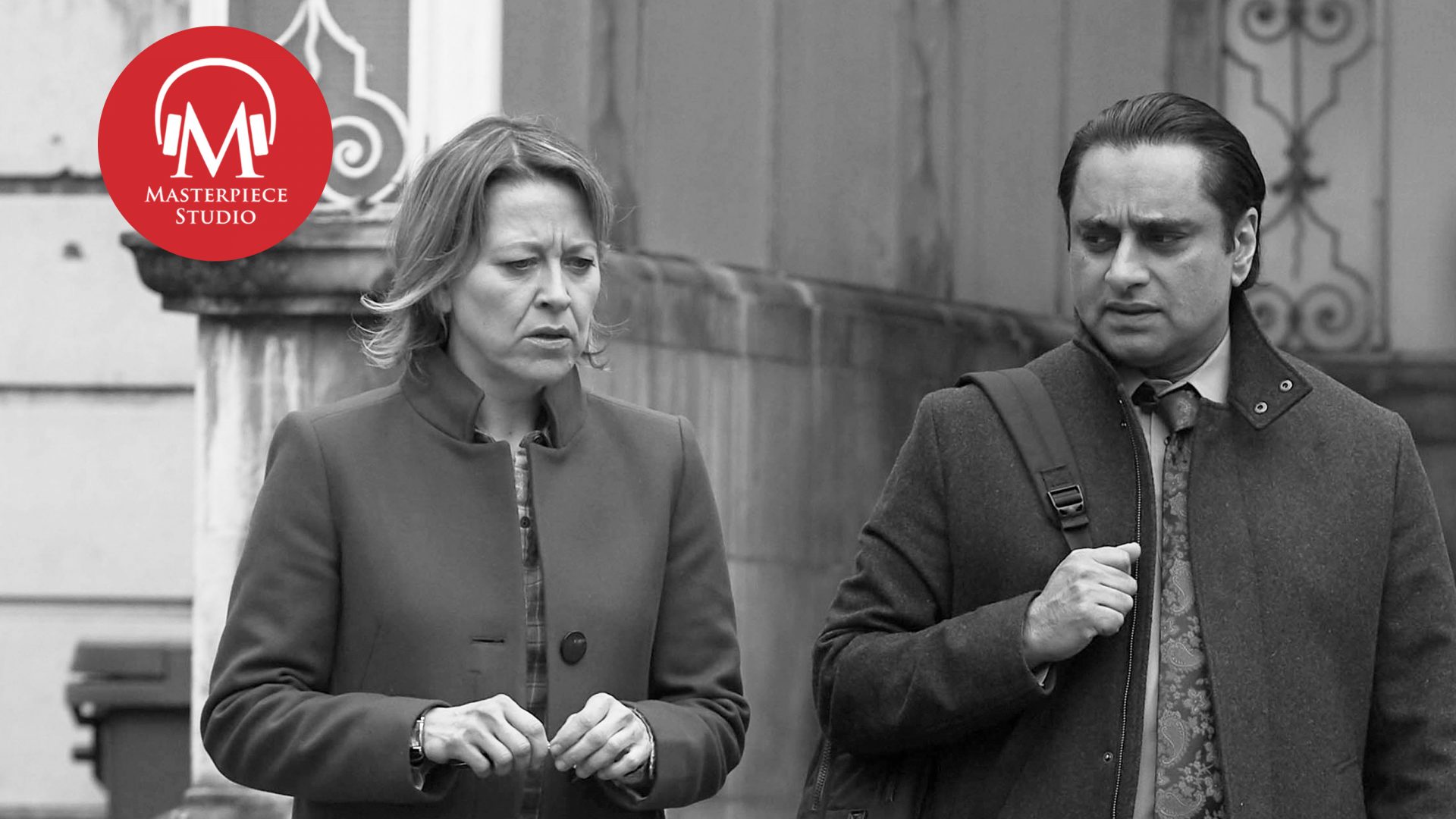

‘Unforgotten’ Creator Chris Lang Obsesses Over Small Details That Add Up To A Terrible Crime
Released 27:24
Related to: Unforgotten, Season 3
Download and subscribe on: iTunes | Spotify| RadioPublic
Transcript
Jace Lacob: I’m Jace Lacob, and you’re listening to MASTERPIECE Studio.
For the last two seasons of Unforgotten, DCI Cassie Stuart and DI Sunny Kahn have worked tirelessly with their unit to solve seemingly unsolvable murders. Sometimes, however, unmasking the killer doesn’t mean that justice is served.
CLIP
Cassie: For me, I think their whole lives have been one long, indescribably brutal punishment. And I can’t just see why we would punish them further. I can’t see who would benefit.
Jace: In this third season of Unforgotten, Cassie and Sunny are once again running down leads as they investigate another cold case. There’s another body and another grief-stricken family desperate for answers as the body of a 16 year-old girl is discovered buried in the median of a highway construction project.
CLIP
Balcomb: Who buries a body in the central reservation of the M1?
Cassie: Someone who doesn’t want it found?
Jace: Unforgotten creator Chris Lang has written every episode of the mystery series thus far. It’s a series that’s just as concerned with the whodunnit of a crime as the whydunnit — and how those left behind in the wake of murder cope with loss and uncertainty.
And this week we are joined by Unforgotten creator Chris Lang. Welcome.
Chris: Thank you. Hello.
Jace: Given the success of Unforgotten’s second season, how much trepidation was there about setting out to write the third series?
Chris: A fair amount. You always want to do better, of course, and season two seemed to have gone down extremely well, both with the audience and critically as well in this country, so it was quite a big ask. And I absolutely did not assume that I could create a show that scored on both those fronts. So a lot of trepidation. Luckily we managed to surpass what we what we did on the second series, I think.
Jace: You write every episode of Unforgotten. How long did it take you to break and script the third season?
Chris: It’s an interesting question, and one I get asked a lot. And the easy answer would be to say, ‘I don’t know, about six months.’ But of course, really to write a show like this, it takes about 57 years, because the reason you can write it in about six months is because of what you’ve learnt over the last certainly 30 years as a writer, but also over the last 57 years as a human being. Because that’s what you bring to your desk every single morning. But you know, I have a very defined way of working, particularly on this show which requires a huge amount of structuring before you start to script. That’s what I do first. First of all I do a little pitch which is sort of four or five pages which sort of sets out the basic idea, and if people like that then I go away and I start breaking it down and characterizing all of the main antagonists and protagonists, episode by episode, and all of their stories and that’s a long, difficult process. That can take, you know, six weeks, seven weeks, but that’s my map, that’s my road map. And without that, I would never even consider starting to script.
Jace: I mean in terms of that construction, which comes first in the development process of that season long arc — is it the crime, the victim, the killer or the suspects?
Chris: It’s a slightly unusual symbiotic process, in that they both inform each other as you move through that process. I think, of course, you know roughly what the crime is when you start, and pretty much on each season, and certainly on the fourth season, which we’ll be starting to make later this year, I pretty much know who done it. But as you move through the storylining process and the characterization process, things shift and tilt and nuances change, which you have to keep adjusting. And you can’t be too rigid about it, you have to be fluid. And in fact if I’ve learnt anything over the last three or four years as I do it, it is to allow myself to be fluid and sometimes just to put markers in place and say, ‘I don’t have to know exactly what that is yet, I just know that a significant thing has to happen there.’ And I think you’ve got to allow yourself to be that free.
Jace: When we had Sanjeev on the podcast, he said of Cassie and Sunny: “What was interesting about Unforgotten was how remarkably unremarkable the two detectives are.” Was that an intention going in, to play Cassie and Sunny as sort of refreshingly mundane people you might meet in your own life?
Chris: Yes. And I’ve always sort of slightly felt that you didn’t need to make detectives distinctive by what I perceived to be fairly external tropes. You know, all of us as individuals are extraordinary in the way that we plot our path through life. That for me is always enough. I didn’t feel they needed any kind of super intuitive powers, or a classic British car, or a drinking problem, or a drug problem or a mental health problem. I just thought it would be absolutely interesting enough if they were just ordinary people with the ordinary vicissitudes being visited upon them in their private lives that seemed to be enough, because you know, the cases that they were investigating, those were extraordinary and that would then reveal something of who they were as people in the process and feeding into that. There was a lot of documentaries coming out in the UK where the documentary makers had managed to gain fairly unprecedented access to the British police force, quite a lot of them were murder squads, and you know, we really began to see what it’s like inside a real British police station and of course it’s nothing like what it’s generally portrayed as on crime drama. It’s mundane and ordinary whilst people are quietly and diligently going about doing this extraordinary job. So it felt to me like the job was extraordinary enough, and you didn’t have to make the people who inhabited that world, you didn’t have to make them extraordinary.
Jace: Each season of Unforgotten could be the show’s final season in a way — the crime is resolved, the killer unmasked, the victim put to rest. As the show’s creator, how important is it that each season stand on its own and offers some sense of resolution at the end?
Chris: I think it’s massively important and I think it’s a problem in a lot of drama that we don’t get resolution at the end. You know, hopefully Unforgotten has the best of both worlds in that it absolutely has a closed ended story of the series, but the characters that take you through that, their story continues so you absolutely have something that makes you want to come back for a for a second or third or fourth outing. But I get very frustrated watching dramas where I know about four episodes into a eight episode run or a 10 episode run, you suddenly twig — ‘Ah man. They’re not gonna tell us how this, why this happened or what you know this incredible conceit that they’ve set up at the beginning, they’re not going to resolve it.’ Well you know, they’ve got their eye on a second season, and pulling us back in the third season. And there are so many where that’s just deeply unsatisfactory for me. And I feel it’s a little cynical, as well, because it’s hard to resolve story. It’s really hard to give a satisfying end to a story. It’s one of the really toughest things as a writer to do well. So, I endeavor to give that resolution and to give that shape that I think an audience want.
Jace: By the end of season two, Cassie rethinks her notion of justice as she believes Sara, Marion and Colin have suffered enough. Has her internal compass gotten dinged in this process?
Chris: Yeah, her compass has definitely been bent a little out of shape and I think season three explores that very subliminally. And I should say, season four explores that even further, and I don’t think as a police officer you can make a decision like the one that she did and it not have consequences. I think you know in a in a thematic echo of the guest stories of the week, that the effects of that can lie buried for a while and I think she can bury them herself, but they will out. And I think you know it’s probably one of the most significant decisions she’s ever made in her professional life. And I think she’s deeply conflicted by it.
Jace: I mean it’s clear that the toll has taken a toll on Cassie especially in this first episode back as she’s not sleeping. She’s isolated from her son, Adam, and her father. She’s very possibly forgetting things. How much of that is emotional strain from the events of season two and how much is just cumulative, sort of psychic damage from her profession?
Chris: It’s both. And you know, I did a lot of research on the effects of a lifetime, as she’s had, you know she’s done 28, 29 years I think, roughly, and I did a lot of research on the effect that that has on you as a person, particularly if you’re working on very serious crime like she is and on murder, like she is. And you know, why would it surprise any any of us to learn that that takes a terrible toll on people and lots of senior police officers in her position really struggle. You know, there’s all sorts of support for them, but seeing people on a daily basis at their very worst than having to navigate your way through the terrible things that people do to one another, of course takes its toll. And you know, that’s again an ongoing thing.
Jace: We begin the third season with the discovery of skeletal remains in the central reservation of the M1. The crane digs down and unearths the bones, literally digging up the past. What were you trying to achieve with that image?
Chris: The bottom line is I had driven down motorways for the last 10, 15, 20 years, and being of that certain mindset, I had turned to my wife on many occasions and said ‘That’d be a fantastic place to bury a body. No one would ever look there.’ And I thought, ‘One day I’ll use that, I’ll stick it in a story.’ And this became the opportunity. You know, on a slightly more cynical level, it works obviously as a metaphor, but also a very interesting visual opening. And we recreated the M1, our biggest motorway in the UK, on a fire service training ground up in Oxfordshire somewhere, and we recreated the whole of the M1. So it was an incredibly visually arresting opening with all those trucks and cars and we had 100 cars going in a loop past the camera. So yes, it was a metaphor and yes, it but it was primarily it was a visual feast, I hope, for the audience.
Jace: There’s a question initially of whether the remains might be archaeological but they’re not. The crime was recent.
CLIP
Cassie: These remains are actually those of a young female, between the ages of 13 and 15. So this is not an adult, it’s not even a young adult. This is the body of a child. Not many children that age go missing without leaving people behind. And somewhere, there surely must be parents who have lived in a world of almost unimaginable pain, for many many years. Let’s give them their child back.
Jace: What is the role of empathy within Unforgotten?
Chris: It’s a complicated one, because in season two, obviously, we explored the notion of victimhood in the sense that your visceral reaction to a victim is great sympathy and empathy, and then and then slowly in story, you learn actually that the victim was not a good man. And how should that inform how you should view them? In terms of how Cassie approaches her job, I think, you know, she’s quite distinct in the sense that she’s not a shouty, angry copper who tries to extract information from suspects in a kind of hectoring or bullying way. She generally tries to understand people. And again, from watching documentaries and the time I’ve spent with the police and all my police advisers, you know, most of them I find are extremely decent people who do a very, very difficult job generally with great dignity and consideration and kindness. And the truth is, of course when you’re trying to get difficult truths and pry difficult truths from people who don’t want to offer them up, the real truth is that you’re much more likely to get them to do that if you are polite and treat them with some sort of respect no matter what they’ve done, no matter how heinous their crimes. If you make them feel like you understand them or you’re on their side, almost, then they will start telling you things that they don’t think they would if you were hectoring them. And then flipping over to the other side, I do think that one of the reasons the show works for an audience is because I think I try and draw the people the characters, the antagonists in a sympathetic way. I try to say, ‘Effectively, there but for the grace of God go we.’ Mostly, they are not, you know, incarnations of evil, mostly they are very human people who have done something dreadful, often. But, I want to show that it’s not that big a leap from being an ordinary person to making terrible mistakes. So, that sort of I think the audience can quite often empathise with the antagonists and say, you know, ‘In another life, you know, I could have done that.’
Jace: The sense of compassion I think is deeply embedded within the show particularly in the scene in this episode where the team makes calls to the families of those missing girls.
CLIP
Lingley: No, I’m sorry, if Jasmine never sustained an injury like that, it really can’t be her I’m afraid……
Collier: No, you cry away Robin, and I’m so sorry I can’t give you any more positive news…
Boulting: …and you’re her sister did you say?
Jessica: Yes.
Boulting: And how sure are you Jessica, that she broke her wrist?
Jace: It’s a task that takes a heavy toll on each of them. Most shows wouldn’t have bothered to depict these exchanges. But why do you feel that they’re at the very heart of what you’re hoping to achieve with Unforgotten?
Chris: Well you know, it’s about my relationship as the writer with the police and what I want to say about them. And again, I explore this even more fully in series four. Because you know, like most people I have a conflicted relationship with them. We like probably most nations, have had periods where the police have not acted as they should and as we would hope them to. And I think because of that we’ve lost some respect for them and our trust in them is diminished. And that’s right and correct and they should be judged and they should be held to a very, very high standard. And yet I think it’s very easy to forget how extraordinarily difficult the job they do is. And I do genuinely believe that most of them do it extremely well. So I wanted to show that, I wanted to show that the police do an incredibly difficult job which takes often a very high emotional toll on them but mostly they do it with decency and courage and kindness. So I think that is important to say that, and I want the audience to kind of get that. That’s where I’m coming from.
Jace: Before this next question, a brief word from our sponsors…
Jace: The first episode follows four men — Tim, Chris, James and Pete, who initially seem like strangers but are revealed toward the end of the episode to be childhood friends. Was there something you wanted to explore with longstanding male friendships this season?
Chris: Yeah, definitely. It was, those names were chosen not entirely by coincidence. Those three names are the names of my three best friends. I’ve known them for 45 years, since I was 11, we met at school, and you know, I was interested in how robust those ties are. You know, we’ve been through a lot together. We’ve all seen each other go through all all the happy times in life and then also some of the really difficult times. So I was interested to see, explore in the story that we explore just how much pressure a friendship like that, which I believe to be pretty profound, how much pressure it can bear and and at what point it starts to fracture, if indeed it does fracture, who survives it and who doesn’t.
Jace: By the end of the episode, the victim in the motorway is identified as Hayley Reid, who went missing on New Year’s Eve 1999. Why did you choose that millennium date specifically?
Chris: Well I actually chose it because on that night nearly 20 years ago, I was with those three mates and a couple of others and all their wives and we did go down to a house in Dorset in the UK to spend it all together. And it was an absolute car crash of a weekend, for a number of complicated reasons, but mainly because one of our number had a bit of a kind of a meltdown really and so I thought that was a really interesting starting point. What happens when something that’s meant to be simple and simply a sort of joyful and happy celebration of of a moment in time suddenly twists? I should say that none of us murdered anyone. But I don’t think we did, anyway.
Jace: James is looking for his missing son Elliot. James finds him and is stunned to see Elliott dressed as a woman. Does Unforgotten make the case that we never truly know those around us?
Chris: Absolutely. I think that’s one of its absolute central premises, or even the question, how well can we know those around us? You know, I’m really fascinated by that idea, the internal monologue that we all have. And we all surely will have experience of a close friend or family member suddenly doing something which utterly stuns us in terms of the behaviour being extraordinary. And we turn to someone else and say, ‘My God I just, I didn’t, I never saw that coming, I never saw that in that person.’ And that happens, you know, fairly regularly in life. And it it always makes you think, ‘Jeez!’ You know? Yow well can we ever really know someone, even the ones closest to us? Even family, even close family will sometimes do the most extraordinary things and actually, you know ,there have been there were quite a few cases that I researched that happened in America of people who were ordinary family men or women and you know, stalwart members of the local community and then it was discovered that they’d done absolutely dreadful things and no one had the vaguest idea that these people had these incredible dark secrets. So yeah, so it’s a very central thing.
Jace: Murder does have a way of drying out everyone’s secrets whether that’s sort of petty crimes like Pete signing the check to himself, or why James is such a terrible father, or the accusation against Tim Finch.
CLIP
Arbiter: So the complaint made against you, Dr Finch, is that on the 27th April 2017, whilst making a house call to Maureen Anne Avery, since deceased, and seemingly unaware that her daughter, the complainant Alison Pinion, was in the house, you verbally abused and threatened Mrs Avery. And that you then told her you’d ‘half a mind to stick her full of morphine and give us all a break.’
Jace: What questions should the audience be asking about these men at this point?
Chris: Could they be capable of doing something so utterly abhorrent? I like the fact that every single suspect remains in the frame from their opening scenes right until their last ones, until the revelation of who was guilty. So those, the audience can keep asking those questions all the way through and they can keep invested in those characters all the way through.
Jace: It’s the titanium plate that allows the team to make the match with Hayley Reid. How difficult is it to come up with these essential physical clues ones that lead to the discovery of the victim’s identities?
Chris: It’s it’s quite tricky, but it’s not, you know, it’s not impossibly hard, just requires a little thinking. And they come to you at the most odd moments — ‘Ah! I know what it will be! It will be that!’ And you know, when you are in the middle of writing a show, you kind of live and breathe it. And absolutely every single night, when I go to bed, some people count sheep to send them off to sleep and I think of my structural and character difficulties, and I just go to sleep thinking about it and I wake up thinking about it and I sit on the tube thinking about it. So you know these little ideas, these little things, that again, it’s another part of the show that the audience really like the minutiae of the investigation, they like that, they like those little details and they like how laborious sometimes it is to get to the piece that will open open a suspect up or open a piece of the investigation up. They really enjoy that, and I enjoy planting them through as well.
Jace: You’ve mentioned a fourth season for Unforgotten. What can you share about the themes you might be looking to tackle this time around?
Chris: Well as I referenced briefly earlier, you know, it will be about our relationship with the police. I think I if I had to describe it, I’d say it’s both a love letter and a j’accuses, which again reflects that slightly conflicted relationship that I think a lot of us have with the police. I hope it’s primarily a love letter. So that’s that’s what it’s about. And again of course tracks the lives of four people, two men, two women. And follows Sunny and Cassie on their journey as well.
Jace: You started your career as an actor. In fact what many listeners may not realize is that you were a comedy duo with Hugh Grant. What was this experience like and what led you to writing?
Chris: It was a very enjoyable experience. We worked together for, I don’t know, four, five years, I think? I came out of the Royal Academy and he came out of Oxford University and we both met at our first job, which was in repertory theatre and shared a sense of humor and so we started to write comedy together, which then developed into a proper stage show which then developed into a TV show. And from that then, I then started writing comedy for other people, he went off and strangely decided to become a film star, I have no idea why, while I was getting 22 quid an hour for writing terrible jokes for Radio 4. So why, why did he make that choice? So he did that and I started writing for people. And I wrote, you know, for a few years I wrote comedy but I absolutely had a desire to write stuff with more substance. And and so after a few years of writing comedy, I think in the early nineties, I started to move into drama.
Jace: Finally what would you say makes a script a Chris Lang script?
Chris: I think they’re quite well structured. I’m quite obsessive about structure. Hence, you know going back to what we were discussing earlier and my desire for closure and and a beautifully structured piece. So I think that well-structured and I hope that there’s humanity within them and you know from objective criticism of the shows or critiques of the shows, you know, people seem to comment on that, and say they have humanity and compassion and they understand people. And so I hope it’s that, you know, I want people to be moved. Certainly in the second season, you know, it’s affected people. It spoke to people and I had a lot of letters and a lot of communication on social media about people who’ve been through a lot of what we explored in that second season. And a lot of people found that incredibly cathartic and very valuable to them, and, you know, you cannot ask for more than that as a writer, that you touch people, you move people and hopefully you help them in some small way. And so yeah, that.
Jace: Chris Lang thank you so very much.
Chris: Thanks, Jace.
Jace: This Wednesday on the podcast, we’re dipping back into the remarkable true story of actor Ruth Wilson’s grandparents, with an interview with the writer of Mrs. Wilson, Anna Symon.
But next Sunday, on MASTERPIECE, we head even further back in time, for a brand-new adaptation of the classic French tale of love, loss, and personal redemption: Victor Hugo’s Les Misérables.
CLIP
Bishop: But you don’t think it possible that kindness and love can change a man?
Valjean: No.
Jace: Actor Dominic West plays Jean Valjean, the tortured convict at the heart of the series, and he joins us here on the podcast after the premiere episode, next Sunday, April 14.
MASTERPIECE Studio is hosted by me, Jace Lacob and produced by Nick Andersen. Elisheba Ittoop is our editor. Susanne Simpson is our executive producer. The executive producer of MASTERPIECE is Rebecca Eaton.
Unforgotten Podcasts 9 More Podcasts
MASTERPIECE Newsletter
Sign up to get the latest news on your favorite dramas and mysteries, as well as exclusive content, video, sweepstakes and more.











